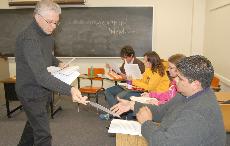Some English writing majors are frustrated at what they consider a shortage of English workshops available in Spring 2007, and many are asking why steps haven’t been taken to increase accessibility.
Though relatively small, the English writing sequence is one of the fastest growing concentrations on campus, with now more than double the number of students taking writing than those enrolled in the literature concentration.
Loyola employs five professors who exclusively teach English writing classes, and the department is offering 10 writing courses in the spring. However, only five of the classes are creative writing courses, three of which are Introduction to Creative Writing. The others are courses like Expository Writing, Grammar and Language and Professional Writing.
Megan Stabiler, an English writing junior, was one student who had trouble finding a suitable class for the spring.
“When signing up for classes for Spring 2007, I felt completely constrained as to what classes I could take,” Stabiler said. “While creative writing is my major, I like to concentrate on areas such as poetry, not fiction. So, needless to say, I didn’t get many choices or diversity with the choices given.”
Fiction and Poetry Workshops aren’t on the list, neither is the Creative Nonfiction Workshop that was also unavailable this fall. With writing classes capping at 15, this leaves upperclassmen with workshop requirements scrambling for 30 spots, odds that decrease even more if a student desires a particular genre.
Mary McCay, chairwoman of the English department, said that this occurrence is relatively normal.
English writing classes operate on a rotation of workshop classes and intermediate writing classes that include limited workshop sessions. But Katrina’s ever-widening wake disturbed the rotation, and the English department has been trying to reconstruct it with reduced resources. McCay emphasized that the English department has been expanding during the past five years.
Elana Lott, English writing junior, was also unable get into the writing course she wanted in the spring. Lott said that, having fulfilled all of her literature requirements, she now only needs to take writing courses.
“I need to have my writing critiqued in a workshop class,” Lott said. “I’ll have to begin applying to graduate school soon, and I need enough revised work to submit.”
Lott was unable to take the class due both to the fact that there is only one section of the course being offered and that the English department is no longer giving out seat cards for workshops in order to maintain the small class sizes necessary to effective workshops.
“The classes were always tight, but now the numbers are getting smaller and smaller,” Lott said.
McCay asks that writing students consider academic diversity and plan ahead when scheduling classes.
“You can’t write unless you read, which is why students ought to take courses in science, history and politics,” McCay said. “Everyone wants to take workshops instead of what they need, which is a wide variety of courses outside of workshops.”
Indeed, writing workshops are often far more attractive to a writing major than common curriculum and elective courses in biology or history, but some students believe that there simply aren’t enough creative writing classes or teachers to teach them.
Ben Sines, English writing sophomore who eventually wants to teach undergraduate classes, worries about graduate school.
“It’s competitive to get into MFA programs. Not only do I need to get in, but I need scholarships, and for that to happen I need my portfolio critiqued by the Biguenets and Poussons,” Sines said, referring to Loyola English professors. “I came to this school to learn writing because of the teachers who work here, and I’m finding it difficult to get to them.”
“To me it just doesn’t make sense that this is a popular major within the university, yet they choose not to expand on faculty and classes,” said Ashley Genz-Foster, English writing senior.
Tony Magee, another English writing junior, agrees.
“It’s pretty ridiculous to see three Introduction to Creative Writing courses taking 15 students each and only two workshops taking 15 as well,” Magee said. “There’s no variety there.”
Brenda Joyner, assistant to the provost, said that she has heard no formal complaint about the availability of classes, but asked that students take into account post-Katrina limitations.
“There has been no intentional lack of classes there, but class rotations and students are out of cycle due to the unusual semester caused by Katrina,” Joyner said.
“We have a marvelous English department and they work together diligently to serve not only the English majors, but all students who come through.”
If students do wish to request more classes, they should meet with McCay, and the request will then go through the dean’s office and then to Academic Affairs, Joyner said. Once there is a formal request, the department and the administration can assess the need.
In the meantime, McCay is more than willing to help students who feel that they’ve hit a dead end.
“Tell any student who is not happy with the way course selection is going to come see me and we will sort it out,” she said.
Maggie Calmes can be reached at mecalmes@loyno.edu.






